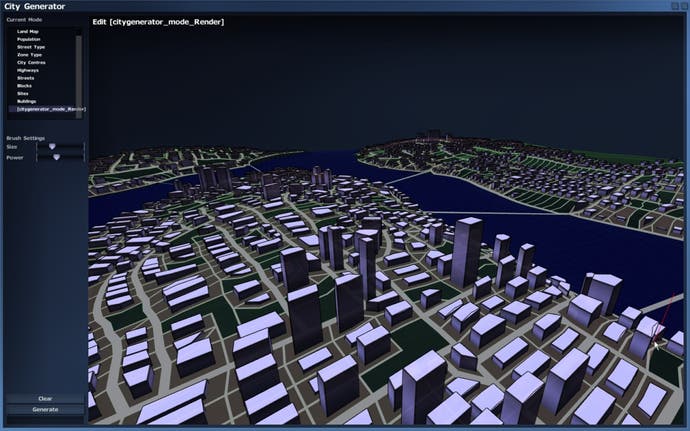DEFCON
Chris Delay gets over his introversion and talks.
I've recently been playing (and enjoying immensely) Gears of War. It's an excellent example of the "Blockbuster" model of game development - this game took a team of thirty people five years and cost Ten Million Dollars to develop. I consumed it in about six hours, the first four of which I enjoyed immensely. The "Blockbuster" model of game development typically involves extremely high budgets, lots and lots of custom made content (levels, textures, cutscenes), and virtually no replayability. It tends to result in extremely high quality graphics and production values, and in the best cases (Gears, Half-Life etc) a stunning game.
There is absolutely no way that Introversion can make a game like this. We scoot around this problem on a daily basis, and all three of our games have been exercises in the avoidance of content-creation. Uplink had its teletext graphics and randomly generated missions. Darwinia had its fractal landscapes and simple sprites (it had ten levels - and took three years - we learnt the content lesson the hard way). DEFCON has virtually no content at all - freely available worldmap data, city data, and sprites.
Procedural content generation is basically a way of generating large volumes of game content automatically. If used correctly it can be extremely powerful and can produce staggeringly complex results. We believe its the key to creating the depth of data you need for a real game world, without having to do it yourself. It can't generate the really good stuff - for that you still need a human writer and creator, but it can create the other 90 per cent of the world that is less important to the experience.
It is fascinating seeing the patterns emerge when doing this stuff. We've found that very similar algorithms can generate anything from city satellite views to office layouts to trees.

It's a project we'd always wanted to do, and DEFCON's release made it possible and feasible. Even during Darwinia's development we had prototype multiplayer game modes working, but they never worked reliably in internet games and we just didn't have the time to finish them. With DEFCON we solved that problem as part of the games development, and this makes it much easier for us to work on Multiwinia (codename) without worrying about the networking stuff anymore.
I guess we'll let you know when we figure it out! It's been an ongoing discussion - we find ourselves revisiting concepts that didnt work the first time around during Future War's development, and they usually don't work this time around either. It's certainly proving to be quite a challenge - Darwinia seems initially to be perfect for multiplayer, but the reality is far from it. Darwinia is essentially an action game and you spend most of your time controlling squaddies, but neither of those things fit hugely well in a multiplayer setting. Having said that, we do have a rich back-story and mythology to draw upon, and established unit types and behaviours, and that helps to narrow things down thematically. Like anything connected to Darwinia its a massive challenge to make it work well, and we love that kind of challenge.
The new headquarters are bearing up nicely - we're still shifting boxes around and trying to bring some semblance of order to the chaos but it's definitely a much better set-up than before. So far, its really the business side of the team who've been most benefiting from this new place so Vic, Tom and Mark [Vic and Tom Arundel and Mark Morris, Introversion's business, marketing and PR brains - Ed] are together most days trying to figure out more outlandish schemes for making some money. In that sense we definitely feel that we've grown up a bit - we have a more healthy working environment set up here, we work more sociable, regular hours and as you'd expect, general communication and efficiency has improved a lot. The dev team is still pretty spread out however, so I'm still up in Cambridge, working from home, as are John and Gary. But the great thing about this new place is that it gives us a solid base, we can hold dev and board meetings here and its a good place for everyone to hangout. We've got a massive BBQ set, a load of consoles, a big projector and lots of sleeping space - what more do you need?








